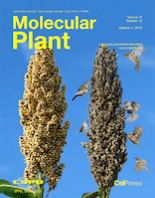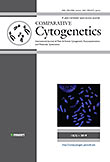
NUCLEUS-INDIA
Scope & Guideline
Catalyzing progress in the field of Molecular Medicine.
Introduction
Aims and Scopes
- Genetic and Genomic Research:
The journal publishes studies on genetic diversity, genomic mapping, and the application of genetic tools such as CRISPR/Cas9, which are crucial for understanding heredity and improving crop varieties. - Cytogenetics and Chromosomal Studies:
Research involving the structure, function, and behavior of chromosomes, including karyotype analysis, chromosome mapping, and the study of chromosomal abnormalities in various organisms. - Molecular Biology and Biochemistry:
Focus on molecular mechanisms, including gene expression, epigenetic regulation, and metabolic pathways, which are vital for plant and animal health. - Plant Sciences and Biotechnology:
Emphasizes innovative biotechnological approaches to enhance crop resilience, nutritional value, and pest resistance, reflecting a strong commitment to agricultural sustainability. - Environmental and Medicinal Plant Research:
Investigation of the role of plants in environmental remediation and their medicinal properties, aiming to explore natural compounds and their potential therapeutic applications.
Trending and Emerging
- CRISPR and Genome Editing Technologies:
There is a notable increase in publications related to CRISPR technology, highlighting its applications in crop improvement, disease resistance, and genetic research, which is crucial for food security. - Epigenetics and Gene Regulation:
Emerging studies focus on the role of epigenetic modifications in gene expression, disease susceptibility, and environmental responses, indicating a growing recognition of epigenetics in biological research. - Plant-Microbe Interactions:
Research exploring the interactions between plants and microbes, including beneficial symbioses and pathogen resistance, is on the rise, reflecting a holistic approach to plant health and productivity. - Nanotechnology in Agriculture and Medicine:
The application of nanotechnology for enhancing plant growth, stress tolerance, and drug delivery systems is increasingly highlighted, pointing to innovative strategies for tackling agricultural and health challenges. - Environmental Genomics and Bioremediation:
Research focusing on the genomic approaches to assess and enhance the bioremediation capabilities of plants and microorganisms is gaining prominence, addressing environmental sustainability.
Declining or Waning
- Traditional Breeding Techniques:
With the rise of genomic technologies like CRISPR and other molecular methods, traditional breeding approaches are receiving less emphasis in the journal, reflecting a broader trend towards genetic engineering. - Basic Morphological Studies:
While foundational, studies focused solely on morphology without a molecular or genetic context appear to be decreasing, as research increasingly emphasizes molecular insights and applications. - General Reviews without Novel Insights:
The journal is moving away from broad reviews that do not contribute new perspectives or data, favoring more targeted studies that provide specific advancements in the field.
Similar Journals

Vavilovskii Zhurnal Genetiki i Selektsii
Advancing the Frontiers of Genetics and SelectionVavilovskii Zhurnal Genetiki i Selektsii, with ISSN 2500-0462 and E-ISSN 2500-3259, is a distinguished open-access journal published by the Russian Academy of Sciences, Institute of Cytology and Genetics. Since transitioning to open access in 2013, the journal has been dedicated to advancing research and discourse in the fields of genetics and selection, particularly within agricultural and biological sciences. With a current ranking of Q2 in Agricultural and Biological Sciences and Q3 in Biochemistry, Genetics and Molecular Biology according to Scopus, it serves as a pivotal platform for researchers, professionals, and students to disseminate their findings and collaborate on innovative ideas. The journal, housed in the vibrant academic environment of Novosibirsk, Russia, publishes a diverse range of articles that contribute to the ongoing evolution of genetic studies and practical applications in agriculture. Its commitment to quality and accessibility ensures it plays an essential role in the global scientific community, fostering knowledge that bridges theoretical research and practical implementation.

Journal of Fungi
Innovating Understanding in Fungal BiologyJournal of Fungi is a premier open-access journal published by MDPI, dedicated to advancing the understanding of fungal biology in its myriad forms. Since its inception in 2015, it has become a vital resource in the fields of ecology, evolution, and plant sciences, attaining notable rankings in Scopus, including Q1 status in Ecology, Evolution, Behavior and Systematics, and Plant Science, with a Q2 ranking in Microbiology (medical). The journal fosters a collaborative platform for researchers, professionals, and students by providing unrestricted access to high-quality, peer-reviewed articles, which encourages the dissemination of innovative findings and methodologies relevant to fungal research. Designed to cater to a global audience, the Journal of Fungi has established its significance in the scientific community, especially from its base in Switzerland, where it continues to contribute to the ongoing discourse in mycology and beyond. With its commitment to open access since its launch and its continuous support for groundbreaking research, the journal plays a crucial role in driving forward the scientific inquiry and ecological awareness in fungal studies.

EMBO REPORTS
Fostering Knowledge in the Heart of Molecular ScienceEMBO REPORTS, published by WILEY, is a premier journal in the fields of Biochemistry, Genetics, and Molecular Biology, recognized for its rigorous peer-review process and impactful scientific contributions. Established in the year 2000 in the United Kingdom, this journal has maintained a stellar reputation, reflected in its consistent positioning within the Q1 category across these disciplines as of 2023. EMBO REPORTS excels in disseminating high-quality and timely research that addresses fundamental questions and challenges in molecular biology and genetics, making it an invaluable resource for researchers, professionals, and students. With impressive Scopus rankings, including Genetics at the 32nd rank and a 90th percentile placement, it fosters an environment for scholarly exchange and advances in knowledge. While Open Access options are not available, the journal continues to enhance its impact through traditional subscription models, thereby maintaining wide visibility in the scientific community. Its ongoing evolution promises continued relevance and influence until at least 2024.

Molecular Plant
Pioneering discoveries at the intersection of biology and agriculture.Molecular Plant, published by CELL PRESS, is a premier journal dedicated to advancing the field of molecular biology and plant science. With an impressive impact factor reflecting its rigorous peer-review process and the high quality of its published research, this journal has achieved a remarkable Q1 ranking in both Molecular Biology and Plant Science categories as of 2023. Its Scopus rankings place it within the top echelons of its field, holding 2nd place in Agricultural and Biological Sciences - Plant Science, showcasing its vital role in disseminating impactful research. The journal covers a broad range of topics, including but not limited to, plant genetics, molecular interactions, and biotechnological advances. Research published in Molecular Plant has the potential to significantly influence agricultural practices and biotechnological applications, making it an essential resource for researchers, professionals, and students eager to stay at the forefront of plant research. Access options for the journal are tailored to accommodate a wide audience, facilitating engagement with cutting-edge findings and breakthroughs. As the field of plant science continues to evolve, Molecular Plant remains integral to fostering innovation and collaboration within the scientific community.

Frontiers in Plant Science
Advancing the frontiers of plant biology.Frontiers in Plant Science is a premier open-access journal dedicated to advancing the understanding of plant biology, covering a broad spectrum of topics including physiology, ecology, and biotechnology. Published by FRONTIERS MEDIA SA in Switzerland, this journal has established itself as a key resource in the field of plant science, boasting an impressive impact factor and ranking in the Q1 category for plant science as of 2023. With its Scopus rank of 61 out of 516 in both Agricultural and Biological Sciences, the journal is recognized for its quality and relevance, being in the 88th percentile among its peers. Since its inception in 2010, Frontiers in Plant Science has embraced an open-access format, ensuring that cutting-edge research is readily available to scientists, professionals, and educators around the globe. The journal aims to foster innovative research and collaboration within the plant science community, making it an essential publication for those looking to stay at the forefront of the discipline.

Open Life Sciences
Elevating Life Sciences Through Collaborative DiscoveryOpen Life Sciences is a distinguished open-access journal published by DE GRUYTER POLAND SP Z O O, dedicated to advancing research across diverse disciplines in the life sciences. Since its inception in 2014 and transitioning to open access in 2015, the journal has become a pivotal platform for researchers, fostering the dissemination of high-quality scientific work while ensuring that valuable findings are freely accessible to the global community. With an impressive categorization into Q2 in Agricultural and Biological Sciences and Q3 in several other fields including Biochemistry and Immunology as of 2023, Open Life Sciences promotes innovation and knowledge sharing across its broad spectrum of topics. The journal's commitment to excellence is reflected in its competitive Scopus rankings, making it an essential resource for professionals and students alike who are keen to stay at the forefront of life sciences research.

Comparative Cytogenetics
Bridging Disciplines in Biological ResearchComparative Cytogenetics, an esteemed journal published by PENSOFT PUBLISHERS, is a pivotal resource in the fields of animal science, biotechnology, genetics, insect science, and plant science. Since its inception as an Open Access journal in 2009, it has significantly contributed to the democratization of scientific knowledge, allowing researchers and students across the globe to access cutting-edge developments in cytogenetics. With an impressive range of articles published from 2010 to 2024, this journal has achieved a commendable impact within the academic community, earning a Q3 ranking in Animal Science and Zoology, Biotechnology, and Insect Science, as well as a Q4 ranking in Genetics, indicating its growing influence. Its Scopus rankings reflect a solid standing, with notable percentiles showcasing its relevance across diverse biological sciences. Located in Sofia, Bulgaria, Comparative Cytogenetics serves not only to disseminate research but also to foster collaboration in understanding cytogenetic dynamics, making it an essential platform for professionals, researchers, and students alike.

CURRENT ISSUES IN MOLECULAR BIOLOGY
Elevating Research Standards in Life SciencesCURRENT ISSUES IN MOLECULAR BIOLOGY, published by MDPI, serves as an essential forum for researchers and professionals in the rapidly evolving field of molecular biology. Established in 1999 and operating under an Open Access model, this journal not only shares high-quality research but also encourages a vibrant exchange of ideas across various disciplines, including medicine and microbiology. With an impressive trajectory leading into 2024, it has earned its place in the Q2 quartile for both Medicine (miscellaneous) and Microbiology, emphasizing its relevance and impact in these areas. The journal’s commitment to disseminating cutting-edge findings is reflected in its diverse coverage of topics, from molecular genetics to microbial interactions. Operating from its home base in Basel, Switzerland, CURRENT ISSUES IN MOLECULAR BIOLOGY is positioned to contribute significantly to the academic landscape, making it indispensable for those seeking to advance their understanding and research within the life sciences.

THEORETICAL AND APPLIED GENETICS
Elevating the standards of genetic research since 1933.THEORETICAL AND APPLIED GENETICS, published by Springer, is a premier journal that has significantly contributed to the fields of Agronomy, Crop Science, Biotechnology, and Genetics since its inception in 1933. With a solid reputation reflected in its Q1 ranking across multiple disciplines for 2023, this journal provides a vital platform for the dissemination of high-quality research that advances our understanding of genetic principles and their applications in agriculture and biology. The journal's indexed status and high impact factor indicate its vital role in shaping contemporary genetic research, marking it as an essential resource for researchers, professionals, and students seeking to stay at the forefront of these dynamic fields. Although it currently does not offer Open Access options, the journal ensures that quality studies are accessible through institutional subscriptions, supporting an informed community of scientists dedicated to innovation in genetics and applied biological sciences.

MOLECULAR BREEDING
Catalyzing Discoveries for a Sustainable Agricultural FutureMOLECULAR BREEDING is a prestigious journal published by Springer, dedicated to advancing the field of agronomy, plant science, and biotechnology through innovative research contributions. With an impressive ISSN of 1380-3743 and E-ISSN 1572-9788, this journal has continuously served the scientific community since its inception in 1995. Operating from the Netherlands, MOLECULAR BREEDING is recognized for its high impact factor and status in the Q1 quartile for both Agronomy and Crop Science and Plant Science in the latest 2023 metrics, highlighting its influential role in these domains. With strong Scopus rankings reflecting its position within the top percentiles of various related fields—including a notable 81st percentile in Plant Science—this journal is essential for researchers, professionals, and students striving to understand and innovate in molecular genetics and breeding techniques. Although it does not provide open access, its rigorous peer-review process ensures that published articles maintain the highest standards and contribute significantly to the scientific discourse. The journal’s diverse scope encompasses significant advancements in molecular biology and genetics, ultimately supporting the global objectives of sustainable agriculture and enhanced crop resilience.